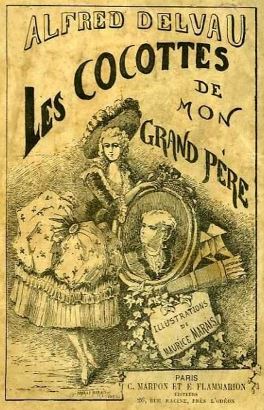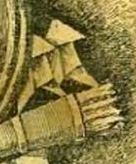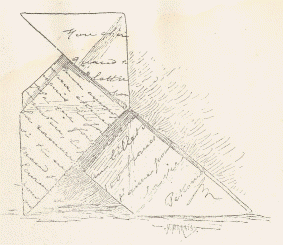| The Public Paperfolding History Project
x |
|||||||
| Les Cocottes de Mon Grand-Pere, 1884 | |||||||
'Les Cocottes de Mon Grand-Pere' is a chapter, appearing in a book of the same name by Alfred Delvau, which was published by C Marpon and E Flammarion in Paris in 1884. A full copy of the book can be accessed at https://gallica.bnf.fr/ark:/12148/bpt6k3412211x/f7.item The frontispiece of the book pictures two folded cocottes.
The author explains that, when he was a child his grandfather used to fold him cocottes ... roughly ...'André, let's make cocottes! And, rummaging around here and there in the drawers of his wooden desk ... he drew out, without deigning to read them, sheets of paper, covered with writing of all styles and all spellings, which he then cut out and made into that little toy that all children know, - alternately paper boat (galiote), bellows (soufflet), double boat (double bateau), police cap (bonnet de police), and finally cocotte'. The list does not seem to make sense in terms of a sequence of folds. The term galiote may well refer to the Chinese Junk design. It is used by Victor Hugo in this sense in his 'L'Homme Qui Rit', published in 1869. (Information from Michel Grand.) There are several designs in the historical record called the bonnet de police or chapeau du gendarme and it is not clear to me which one is intended here. The author goes on to say that after his grandfather's death ... again roughly ... 'I had not forgotten my grandfather, but I had completely forgotten his cocottes, when a few days ago, rummaging in a piece of furniture I found the relics of my past life, childhood and youth - my baby toys and my middle school notebooks, my love letters and my Latin themes, my thoughts and my elegies ... and a crowd of yellowed little papers, folded in a strange way: they were the cocottes formerly made by my grandfather for our entertainment. I unfolded these little yellowed papers with emotion, and once unfolded, I had the indiscretion to read them. Some were fragments of letters, of an illegible, feminine, writing. The rest were fragments of a diary - the diary of my ancestor's life. I burned the first ones ... but I have kept the second ones, which I am not afraid of setting out today, having put them in order ...'
**********
|
|||||||


